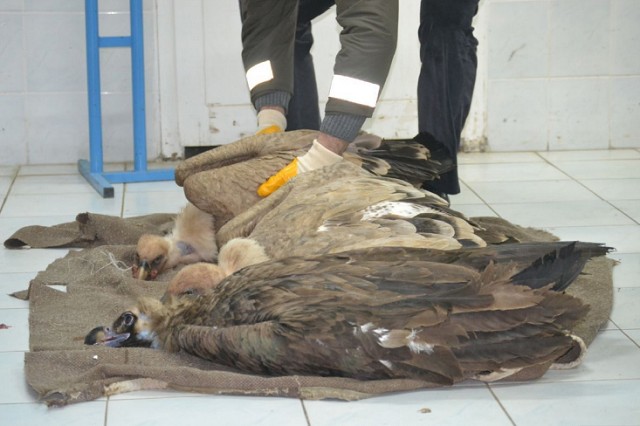Horrific vulture poisonings continue in Turkey
Raptor persecution is not just a threat to endangered species in western Europe, as a series of incidents of vulture poisoning in eastern Turkey have shown this month.
On 16 January, Yusuf Yilmaz, from Igdir province in eastern Turkey, close to the Armenian border, saw a group of vultures lying on the floor not very far from the garbage dump in Tuzluca. When he approached the birds, he saw a gruesome spectacle: four Black Vultures and two Griffon Vultures were lying there dead or dying in a small area, next to the remains of what looked like a dog or Fox, which had probably been baited with poison.
Yusuf called his son Ahmet, a local nature photographer, who then alerted the local National Parks office (DKMP), who immediately dispatched a team to the site. In less than one hour, the dying vultures were brought to a wildlife rehabilitation centre at the local Kafkas University, run by KuzeyDoga, a Turkish NGO with which the Vulture Conservation Foundation (VCF) is collaborating with on Egyptian vulture research. Veterinarians there tried to save the birds, but could only bring one Griffon Vulture back to life through administering serum and injecting atropine to neutralize any potential poison.
Necropsies were done at the local university on two of the dead vultures, while the three other corpses were frozen so they could be sent to a national reference laboratory in the capital, Ankara. Experts from the VCF have been advising and helping in this process.
While full results of the necropsies are still to appear, VCF experts suspect that we are faced with yet another case of poisoning, probably using carbamate or an organophosphate. These are fast-acting poisons that kill almost instantly, and the fact that the birds were found belly-down with folded wings often indicates such a poison. Another possibility could have been ingestion of a strong rodenticide.
The VCF say that, in cases like this, it is crucial to find the birds as soon as possible, isolate the area, have the birds collected by expert staff that are then able to collect samples from the birds' vomit, or the mouth, oesophagus, stomach, crop and intestines, to try to identify any poisoning agent. Also, a thorough search on the talons, palate and tongue could also yield traces of poisoned bait. Identifying the poisoning compound is essential to determine likely root causes of poisoning, and also to investigate the potential culprits.
The area should also be thoroughly searched to identify and eliminate the remainder of any poisoned baits. In this case, it seems that some bait may well have been left on site, as this weekend — just one week after the main incident — a moribund Black Vulture and another dead Griffon were found. The Black Vulture was again saved by fast action by the Yilmaz family, DKMP, and KuzeyDoga team.

Three of the vulture corpses (with a dead Black Vulture at the front) are displayed prior to the start of the necropsy procedures (Photo: KuzeyDoga)
José Tavares, director of the VCF, said: "Poison is the single biggest threat to vultures worldwide. Usually the poison is directed at carnivores like Wolves and Foxes, but ends up killing scores of vultures and other scavengers that accidentally feed on poisoned baits." Poisoning of wildlife is illegal in Europe and in Turkey, as well as being indiscriminate and extremely harmful. Despite this, there has been a prolonged series of poisonings in Iberia, adding to the radical decline in numbers in southern Asia due to the introduction of the vetinerary drug dicofenac into the greater ecosystem.
The VCF has been working with veterinarians, NGOs, farmers, local administrations, law enforcement agencies and governments to fight against this threat. Public awareness, participatory solutions, adequate research and diagnostic and law enforcement are key to prevent poisoning.
Cagan Sekerciouglu, award-winning conservation biologist and president of KuzeyDoga, said: "Most poisoning incidents go unnoticed or undocumented. In this case, the immediate reaction and excellent collaboration between local people, staff from Turkey's Nature Conservation and National Parks agency (DKMP), our vets and staff, and also staff from VCF and Kafkas University, has resulted in the saving of a Griffon and a Black Vulture, and in the establishment of proper procedures that should in the end lead to the discovery of the solution to this sad and dramatic poisoning incident."
Visit the KuzeyDoga website at www.kuzeydoga.org.

